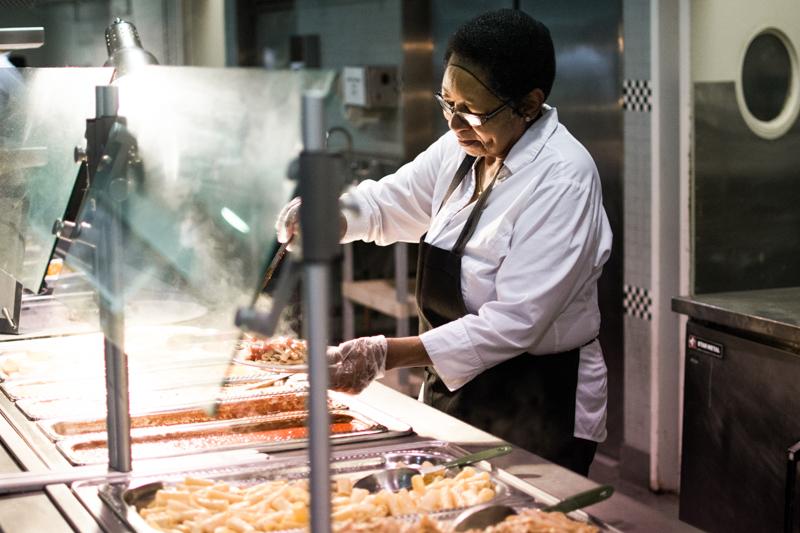CDS Workers: We’re Overworked, Disrespected
Ann Backey, an employee of the Bon Appétit Management Company, serves pasta at Stevenson Dining Hall. Campus Dining Services has recently suffered from understaffing problems, and some employees say they feel very overworked.
October 2, 2015
The Lord-Saunders Dining Hall did not open for dinner on Sunday night, and some stations in Stevenson Dining Hall went unfilled.
While the closures may have been nothing more than a minor inconvenience for students, they point to larger problems: severe understaffing in Campus Dining Services and a general sense among some workers that Bon Appétit Management Company pushes them to the limit and does not give them enough respect.
According to Director of Dining Services Michele Gross, CDS is currently operating shorthanded because of a glut of recent retirements. Since the whole hiring process takes three to four months to complete, the result is a dining service operating without the required workforce.
“There’s just an unfortunate set of circumstances with people retiring,” Gross said. “It’s very unusual for us to have this many people that we have to hire at once.”
But some workers see the vacancies as evidence of the management’s incompetence.
“We can’t hire people,” said CDS worker and United Auto Workers bargaining representative Robert Sullivan. “These jobs on campus are good jobs … and they can’t fill these spots.”
According to Sullivan, management has greatly exacerbated the problem with overly stringent hiring requirements.
“This is secret service stuff,” Sullivan said. “I don’t even know how I got the job [with] the standards they have. This is crazy. We have a good crew, and I do appreciate the process of hiring people, because we get good people once we do hire them, but man oh man, we have a lot of holes to fill.”
The chronic understaffing has gotten to the point where several workers reported having to work through their breaks in order to finish meals on time.
“It’s pretty close to impossible to take a real break because even if I were to try to take a break, it’s just going to put me behind,” CDS worker Carol Altenburger said.
Gross denied that CDS would “knowingly” prevent workers from taking breaks and stated that every worker should take a break — with no exceptions.
“If somebody came and said that to us, then we would indicate to them that we need to sit down and talk to them and see why they can’t [take a break],” Gross said. “That’s a tough one, because here’s a person who’s showing dedication, who’s saying I want to do a good job and I feel like I can’t take my break, but then we’re going to say, ‘Well, let’s look at it, because you need to take a break.’”
Since Bon Appétit began operating at the College in 2001, the dining service has started to cook more and more items from scratch as opposed to using prepared food. To some workers, the shift has meant a drastic increase in workload over an extended period of time.
“The volume of work is just increasing to the point where now everything is made from scratch,” Altenburger said. “In one aspect, maybe that’s a good thing; but in another aspect, you have 30 pounds of beans, 25–50 pounds of rice — all these things have to be lifted and prepared. The black beans now have to be cooked, steamed, rinsed, chill blasted and then used. So that process is an enormous amount of work just to get black beans.”
For First Cook Brice Wilson, the problem is that more and more things are made from scratch without any steps taken by management to keep the workload at a consistent level.
“Since I’ve worked here, there’s probably at least 50 percent more work being produced by each individual during their shift because of scratch cooking, but there comes a point when you have to recognize that your day is full, and if you add something, you need to take something away,” Wilson said.
The switch to cooking things from scratch reflects a conscious decision by the College to provide fresh, natural and healthy food, Gross stated.
“Many fewer things were made from scratch 15 years ago, but that’s the reason we chose Bon Appétit, to change that,” Gross said. “I don’t want things coming out from a box and having [all] kinds of preservatives. We want the food as natural as we can get it. … We want the food to be prepared by people in the building so that we know what’s in it and that it’s fresh and that it’s safe. We don’t want stuff out of packages.”
The understaffing problems also come as the College tries to get the UAW to allow time management of workers. To Wilson, the push to record working speeds and potentially discipline workers is more reflective of the corporate culture of Walmart than that of Oberlin College.
“People work at different speeds, essentially. We’re not robots,” Wilson said. “I probably don’t work as fast as I did 10 years ago. In another 10 years, I might have more physical nagging injuries that are really produced [by] the line of work we’re in. I walk about 10 miles in the kitchen every day, and over time that wears down your body. Oberlin College has always been a place where people can work towards retirement with dignity, and my concern is that a policy like that could enable them to target individuals who they want to force into retirement by telling them they work too slow.”
Many workers are further frustrated by the fact that they can’t modify the recipes, and that their suggestions for improvement are continuously ignored by Bon Appétit managers.
“A lot of us have culinary backgrounds that are very strong,” Altenburger said. “A lot of us have had either our own catering businesses, or a lot of people have gone to culinary schools. We know what we’re doing with food, but sometimes it looks like we don’t because we’re running around like chickens with our head[s] cut off trying to get some of these untried recipes done and hoping we don’t upset somebody to the point where we get a disciplinary write-up.”
To Gross, however, sticking to the recipes is vital to giving students accurate information about what they’re eating.
“I really felt that it was important that the ingredients were known to clients, and that as much nutritional information be known to clients as possible. That means you have to have tested the recipe. You can’t say how much salt is in this, how many calories it has unless you know what you put in it.”
According to one worker, Bon Appétit’s contract with the College will be up for bid after this year. Some workers feel that the College should decline to renew the contract and, instead of hiring another management company to oversee CDS, produce everything in-house.
“I don’t understand why we have Bon Appétit in the first place,” Sullivan said. “I don’t know what they do. … From simple things like menus, ordering and scheduling, they seem to be incompetent. A lot of us are more qualified than the managers managing us, but they continue to make mistakes that we can help them with, in terms of ordering or scheduling or anything. We have a lot of knowledge that they have no need for.”
Worker problems with Bon Appétit extend significantly beyond the usual range of workplace concerns. The College recently settled a lawsuit with a CDS employee who claimed to have been sexually harassed by Dean Holliday, a Bon Appétit executive chef. While Holliday now works at Case Western instead of Oberlin College, he remains a Bon Appétit employee — a fact that one worker described as “disgusting.”
In the eyes of some workers, Bon Appétit’s flaws are deeply ingrained in the company culture.
“Don’t tell the truth to anyone, don’t answer any questions, don’t look anyone in the eye — those are Bon Appétit core values,” Sullivan said. “Aside from that, everything is fine!”


























